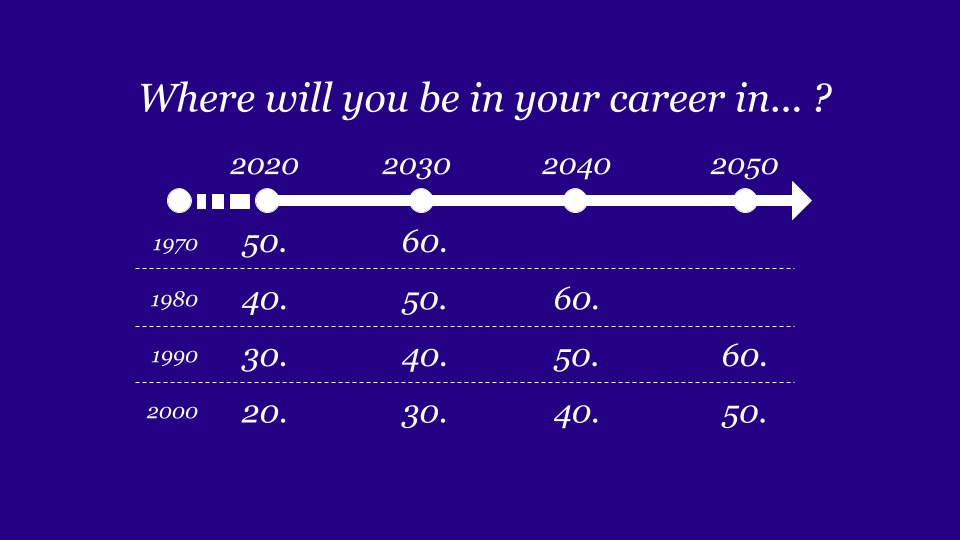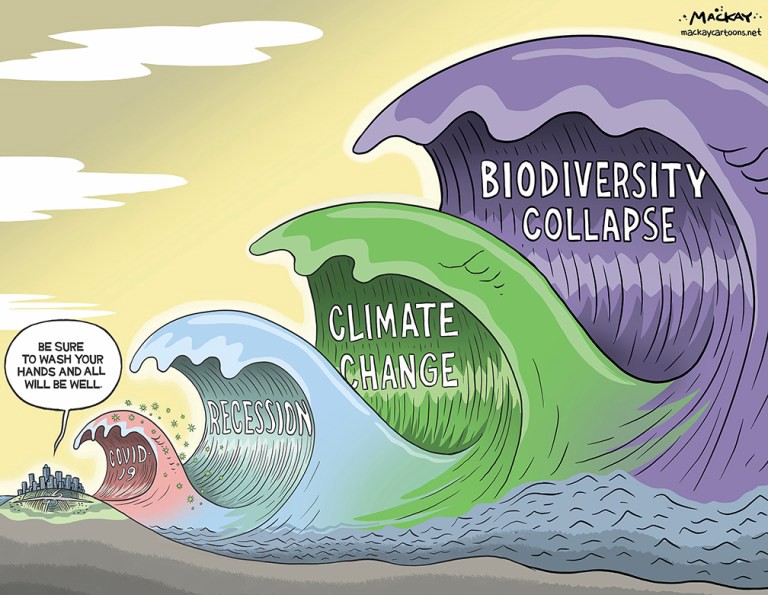“I am a student in an engineering school specializing in aeronautics. I can’t find an internship, not to mention a permanent contract! That entire sector is in crisis due to the Covid-19 pandemic. I am considering a career change.” This statement was made to me a few days ago during a training course on climate change.
Working to reduce risks and adapt our society to better control our collective destiny in the next 10, 20 or 30 years is, in my opinion: necessary, exciting and a source of many professional opportunities. How so?
01. A career links 3-month and 30-year priorities.
Let’s start with a timeline as a framework.

Were you born in 1990? If so, that means in 2050, you will be 60, your career will not be over. Were you born in 2000 and are in your graduate studies? At 50, you will still be a long way from retirement.
The career, a way to break the “Tragedy of the Horizon”?
In 2015, Bank of England Governor Mark Carney enshrined the antagonism between short-term and long-term interests with the phrase “Tragedy of the Horizon.” In a business, operations are carried out on an hourly, daily and weekly basis. Goals are set for 3, 6 or 12 months and strategic plans rarely exceed 3 to 5 years. The issues at 10, 15 or 20 years are not taken into account: why look forward 10 years if the company goes bankrupt in 6 months?
Planning your professional career encourages you to integrate the long term into your daily life.
On the contrary, a career takes place over 2, 5, 10 or 20 years. In 2020, these time frames project us into 2025, 2030, 2040 or even 2050. Within these horizons, the scientific reports are clear: profound changes will happen on a planetary scale as human activities have destabilized many natural and climatic balances. In 2019, the IPBES report concludes:
“Nature across most of the globe has now been significantly altered by multiple human drivers, with the great majority of indicators of ecosystems and biodiversity showing rapid decline. […] Human actions threaten more species with global extinction now than ever before.”

02. Choose professions that give us collectively better control over our destiny.
There are many more warnings: health issues, resource depletion, social and geopolitical tensions, technological innovations, etc. These upheavals force us to anticipate: what will be the response capabilities of our society to these threats? What will be the economic and social consequences in the coming years? What are the prospects for recruitment and employment by sector?
Facing these challenges = businesses of the future + tangible solutions + meaning in one’s work?
Working on risk reduction and on adaptation to these changes could turn out to be a relevant strategy for:
- Choosing a “business of the future”: working on tangible solutions against growing problems in the short, medium and long term would be a good bet for choosing sustainable economic sectors.
- Taking concrete steps on a daily basis: fear, anxiety and even denial are frequent reactions to threats that are beyond our individual control: what to do? Where to start? Choosing your job is a practical option for investing your time and energy in reducing these risks.
- Finding meaning in one’s work: a growing share of the workforce expresses the desire to feel useful and to participate in ambitious projects with a positive impact at work. This phenomenon concerns all age groups: from young graduates to late-career workers. Finding meaning in your work is easy when it focuses on reducing risks and better preparing our society for the threats it is facing.
03. Building new capabilities in the face of these threats is an opportunity to create jobs and develop new economic sectors.
In agriculture, solutions must be found and deployed on a large scale to produce healthy food in sufficient quantities to feed the population, while preserving the soil, biodiversity and freshwater reserves during more frequent and more intense droughts. The demand is there: In France, organic food purchases grew in value by 15.7% between 2017 and 2018 alone. The skills needed to ensure food resilience are multiple: agronomists, biogeochemical researchers, farmers, entrepreneurs, logistics specialists, etc.
In the industrial sector, the stockouts of masks at the start of the Covid epidemic (p.32) demonstrated that France did not have the industrial capacity to produce masks and respond quickly enough to this health crisis. The digital industry is another striking example. While the economy becomes increasingly digital, France and Europe are very dependent on their economic partners. They have neither the raw materials nor the processing, production or assembly industries, as the manufacturers of cell phones, computers, and computer systems are primarily Asian and American.
Building these industrial and technological capabilities would enable better control of the value chain, the skills, the technical and environmental specifications of hardware and software equipment, and possibly to develop more resource-efficient products with a maximised lifespan in order to emit less carbon.
Building new collective inventiveness is a fundamental issue in order to involve, inspire and bring hope to as many people as possible. Take the example of cycling and land use planning. Land use planning and infrastructure determine the distances traveled daily by people and goods, their energy consumption, their greenhouse gas emissions, and their exposure to price increases or supply problems. Over the past few years in France, for many people, cycling has gone from being a dangerous and marginal mode of transport to the obvious choice for getting to work, shopping or even taking their children to school. Bicycle rental companies and repairers have become new centers of neighborhood life and cycling a driver of social integration. The demand for bikes, cycling equipment and spare parts is booming. Prime Minister Jean Castex told Senators on July 16, 2020:
“Cycling is good for the environment, it’s good for health […], it’s an essential subject, a practical subject, people will understand that, it’s a good way to make ecology and sustainable development accessible to all.”
It’s your move!
Which career path will you take to face the crises of the 21st century?
To read this article in French, find Pierre on Medium.
Feature photo by Artem Maltsev on Unsplash.
License and Republishing
The Choice - Republishing rules
We publish under a Creative Commons license with the following characteristics Attribution/Sharealike.
- You may not make any changes to the articles published on our site, except for dates, locations (according to the news, if necessary), and your editorial policy. The content must be reproduced and represented by the licensee as published by The Choice, without any cuts, additions, insertions, reductions, alterations or any other modifications.If changes are planned in the text, they must be made in agreement with the author before publication.
- Please make sure to cite the authors of the articles, ideally at the beginning of your republication.
- It is mandatory to cite The Choice and include a link to its homepage or the URL of thearticle. Insertion of The Choice’s logo is highly recommended.
- The sale of our articles in a separate way, in their entirety or in extracts, is not allowed , but you can publish them on pages including advertisements.
- Please request permission before republishing any of the images or pictures contained in our articles. Some of them are not available for republishing without authorization and payment. Please check the terms available in the image caption. However, it is possible to remove images or pictures used by The Choice or replace them with your own.
- Systematic and/or complete republication of the articles and content available on The Choice is prohibited.
- Republishing The Choice articles on a site whose access is entirely available by payment or by subscription is prohibited.
- For websites where access to digital content is restricted by a paywall, republication of The Choice articles, in their entirety, must be on the open access portion of those sites.
- The Choice reserves the right to enter into separate written agreements for the republication of its articles, under the non-exclusive Creative Commons licenses and with the permission of the authors. Please contact The Choice if you are interested at contact@the-choice.org.
Individual cases
Extracts: It is recommended that after republishing the first few lines or a paragraph of an article, you indicate "The entire article is available on ESCP’s media, The Choice" with a link to the article.
Citations: Citations of articles written by authors from The Choice should include a link to the URL of the authors’ article.
Translations: Translations may be considered modifications under The Choice's Creative Commons license, therefore these are not permitted without the approval of the article's author.
Modifications: Modifications are not permitted under the Creative Commons license of The Choice. However, authors may be contacted for authorization, prior to any publication, where a modification is planned. Without express consent, The Choice is not bound by any changes made to its content when republished.
Authorized connections / copyright assignment forms: Their use is not necessary as long as the republishing rules of this article are respected.
Print: The Choice articles can be republished according to the rules mentioned above, without the need to include the view counter and links in a printed version.
If you choose this option, please send an image of the republished article to The Choice team so that the author can review it.
Podcasts and videos: Videos and podcasts whose copyrights belong to The Choice are also under a Creative Commons license. Therefore, the same republishing rules apply to them.





